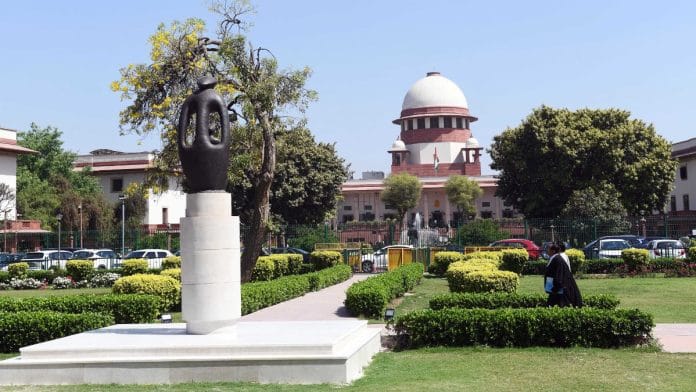New Delhi: One cannot randomly pick a person and suspect them of being a foreigner, the Supreme Court (SC) said Thursday as it settled a legal battle for citizenship by an Assam resident that had lasted for more than two decades. What he went through was a “grave miscarriage of justice”, the court said.
In 2002, a sub-inspector in Assam filed a complaint against Mohd. Rahim Ali, alleging that the latter was a foreigner. The sub-inspector did not have any material or supporting documents, but made the complaint at the behest of a police officer senior to him.
This was followed by a seven-day inquiry, during which Ali failed to present his documents.
Since then, Ali has been fighting against the legal system owing to a provision (Section 9) under the Foreigners Act, 1946, which shifts the burden of proof to the accused themselves.
This means that instead of the state having to prove that one is not a citizen, the responsibility falls on the individual himself or herself.
SC declares Ali an Indian citizen
From the FIR in 2002 and the decision of the Foreigners’ Tribunal in Nalbari (Assam) to the Guwahati High Court (HC) ruling in 2015, all had said that Ali was unable to prove that he was an Indian citizen under the aforementioned provision of the Foreigners Act. He then approached the SC in a civil appeal against the Guwahati HC order, which had held him to be a foreigner.
Noting that there was absolutely no material against Ali but only minor inconsistencies such as spelling errors in the documents presented by him, the SC has now declared him an Indian citizen. “Putting an authoritative quietus to the issue, the appellant is declared an Indian citizen and not a foreigner. Necessary consequences in law shall follow,” the SC held.
Ali raised several contentions regarding his citizenship before the SC, including that his parents’ names appeared on the Assam state voting list for multiple years, and that his daughter was issued a residence certificate.
Despite having documents indicating that his family was in India long before 1966, those were rejected based on spelling inconsistencies.
The state said that Ali had illegally migrated to India and that he was not an Indian citizen.
Referring to Section 9 of the Foreigners Act, the SC said the the provision did not mean that the state could proceed against an individual without any material or information.
“However, the question is that does Section 9 of the Act empower the Executive to pick a person at random, knock at his/her/their door, tell him/her/they/them ‘We suspect you of being a foreigner.’, and then rest easy basis Section 9?,” the SC said.
“Obviously, the state cannot proceed in such manner. Neither can we as a court countenance such approach,” the SC added.
It also said that it was critical to have some material or evidence against an individual and there was not even an “iota of evidence” against Ali to proceed with in this case.
“In the absence of the basic/primary material, it cannot be left to the untrammelled or arbitrary discretion of the authorities to initiate proceedings, which have life-altering and very serious consequences for the person, basis hearsay or bald and vague allegation(s)”, the SC observed.
It added that Ali had not been provided with any material which the police could use against him. This is a requirement both under the foreigners’ legislation and principles of justice.
Under ‘audi alteram partem’ (hear the other side too) — a basic principle of natural justice recognised in Indian law — it is mandatory to share material against the accused with them, the SC said.
The SC added that the discrepancies pointed out in the documents provided by Ali, such as spelling errors, were only “minor”, and the authenticity of the documents was not in doubt.
It is not uncommon for illiterate and uninformed persons who don’t own property not to have official records, the court said, taking note of the illiteracy in the state, too. “The [Foreigner’s] Tribunal seems to have been totally oblivious to all this.”
Akshat Jain is a student of the National Law University, Delhi, and an intern with ThePrint.
(Edited by Radifah Kabir)
Also read: SC-appointed panel suggests felling 2,818 trees for road work in Taj zone, 1k fewer than UP proposed






